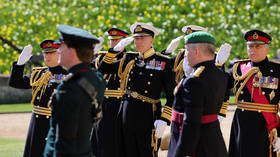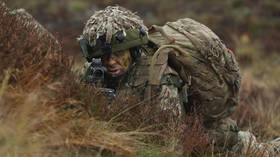Next UK PM must know ‘biggest threat’ is Russia – military chief

Boris Johnson’s successor as British prime minister should recognise that Russia is the “biggest threat” to the UK, the Chief of the Defense Staff, Admiral Tony Radakin, has said.
The briefing that the new leader will receive from the military top brass will be “dominated by Ukraine and the support that we are providing to Ukraine,” Radakin told BBC One’s Sunday Morning program. “And then we have to remind the prime minister of the extraordinary responsibility they have with the UK as a nuclear power.”
Johnson announced his resignation earlier this month after several high-profile scandals and a wave of resignations of his cabinet ministers, but will remain in office until his replacement is chosen.
Under the outgoing PM, London has been one of the strongest backers of Kiev in its conflict with Moscow, supplying Ukraine with arms, training its troops, and advocating for a military solution to the crisis, while also imposing sweeping sanctions on Russia.
According to the assessment of the British military, Russia has “a relatively stable regime,” which means that it's going to keep endangering Britain in years to come, Radakin said.
“The challenge of Russia is going to endure way beyond 2022 and 2023 and 2024, this is going to go on for a long time… potentially decades in terms of Russia as a threat,” the admiral predicted.
Moscow’s land forces “are probably less of a threat in the short term because of that degradation, that depletion that we're seeing with their struggle in Ukraine,” he said.
“But Russia continues to be a nuclear power, it's got cyber capabilities, it's got space capabilities, and it's got particular programmes under water so it can threaten the underwater cables that allow the world's information to transit around the whole globe,” he warned.
When asked about the shape that the UK military would be in if the defense spending is increased to 3% of GDP, as is being suggested by some politicians, the admiral said the armed forces “would be even more modern and they would have even more punch and they would have even more impact around the world.”
Last month, Radakin admitted that the UK had already given so many weapons to Ukraine that it would take years for the country to replace them.
“Yes, you can churn out shells and artillery, but even at the not super-sophisticated end, even at the modest end of an NLAW [anti-tank] weapon, then that’s going to take several years to get back to our original stocks,” he told parliament.
Britain would need between five and ten years to be able to field a division that “that we would want,” according to the admiral.














